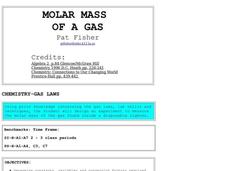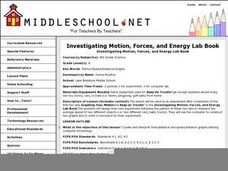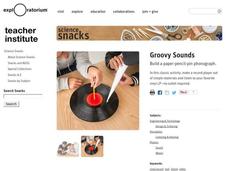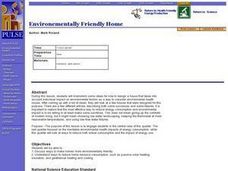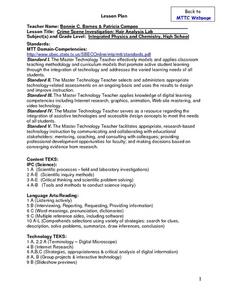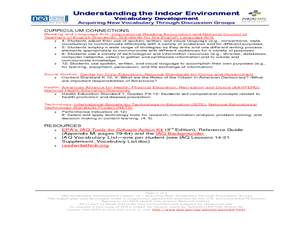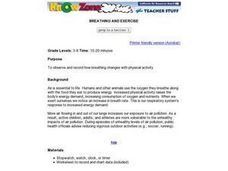Curated OER
Using Facebook with Literature
Young scholars use online social networking to learn about characters in literature. In this literature and technology lesson, students visit Facebook website and set up character profiles for a piece of literature they've read.
Curated OER
Molar Mass
Students apply the ideal gas law and Dalton's Law of Partial Pressure to develop an experiment which determine the molar mass of butane from disposable lighters. In small groups, they develop a procedure and have it approved before...
Curated OER
Jacksonian Democracy
Students determine how technological advancements have formed history. In this Jacksonian democracy lesson, students research innovations of the era and then compare them to the technological innovations of today. Students also debate...
Curated OER
A Monument to Value
Students build a monument to represent trustworthiness. In this trustworthiness lesson plan, students discuss traits related to trustworthiness, suggest images that represent trustworthiness, and build a monument with those images.
Curated OER
Compliment Tickets
Fifth graders complete activities to learn about giving and receiving compliments. In this compliment instructional activity, 5th graders receive compliments from their teacher. Students receive tickets when they get a compliment and...
Curated OER
Cooperative Learning Duties
Students learn how to be held accountable while working in groups. For this accountability lesson plan, students complete an assignment in groups and everyone has a role to be held accountable for.
Curated OER
Investigating Motion, Forces, and Energy Lab Book
Eighth graders create their own experiements using toy trucks, cars or balls to measure the time it takes two of them to travel 5 meters, as well as at each 1 meter interval. They make use computers to make a time/distance graph and...
Exploratorium
Groovy Sounds
Make music. Class members construct a simple record player using a paper cone and a pin. The resource provides a description of what is happening and why listeners can hear the sounds through the cone.
Curated OER
Rockin' Minerals
Third graders view a clip of the video Backyard Safari, "Rocks and Minerals," and discuss properties of rocks and minerals. They view and discuss a clip on where rocks and minerals are found.
Curated OER
Environmentally Friendly Home
Young scholars discuss ways to make homes more environmentally friendly. They comprehend ways to reduce home resource consumption, such as passive solar heating, insulation, and geothermal heating and cooling
Curated OER
If My Configurations are Correct
Students write the electron configuration of elements in the ground state. In this chemistry lesson, students draw how subatomic particles are arranged in the atom. They construct Lewis dot diagrams of valence electrons.
Curated OER
So -- What's Happening Here, On This Old Christmas Tree Farm?
Pupils review their prior knowledge on biomes and ecosystems. At a local Christmas tree farm, they work together in groups to identify the changes occuring in the area. They participate in solving a mystery in which they determine the...
Curated OER
Exploring the Solar System
Students are introduced to the nine planets and countless moons of the solar system. Using the internet, they research one of the planets to determine if a manned mission to the planet would be possible. They share their information...
Curated OER
Crime Scene Investigation: Hair Analysis Lab
Students participate in a hair analysis lab. Using a digital microscope, students compare and contrast hair samples. They determine if the hair samples are human or animal. After completing lab results sheets, students share their...
Curated OER
Vector Manipulation Unit
Students are introduced to the concept/idea of a vector, what it represents and why they are used. They develop an understanding of what vectors are, how and why they are used.
Curated OER
Understanding the Indoor Environment: Vocabulary Development
Pupils acquire new vocabulary by reading an assigned text and determining the meanings of unfamiliar words. In this vocabulary development lesson, students acquire strategies to use in a small group as they decode meanings of...
Curated OER
Discovering Chemical Changes
Fourth graders predict what happens in a teacher demonstration of a chemical change, before watching it. They observe the demonstration and list what the see on the board before determining which represent chemical change. Working at...
Curated OER
Cost Effective Egg Drop
Students create cost effective ways to protect an egg. In this cost conscious lesson plan, students complete an egg drop activity while spending the least amount of money possible.
Curated OER
Germs and the Body
Students illustrate where germs exist, how they can get into and affect the body, and how the body defends itself against them.
Curated OER
Discussion of Adaptation
Students discuss ways in which dinosaurs adapted to their environments. They apply the same logic to an analysis of human habitat, survival needs, and survival need fulfillment to explain how people have adapted to their environment.
Curated OER
King of the Mound
Students investigate water as an agent of change. They conduct an experiment involving a mound of soil, observe and record any changes that occur when ice melts on the mound of dirt, and create a drawing of the changes that take place...
Curated OER
Properties of Waves
Third graders observe and investigate wave properties and compare the properties of particles and waves. They fill a pie pan half full with water, place a toothpick in the center of the pie pan, then drop a marble into the pan and...
Curated OER
Help I've Fallen And I Can't Get Up
Students examine how natural disasters impact humans and how to develop a disaster relief plan. They develop a list of natural disasters, and in disaster relief teams, create an emergency plan for their families to follow if a selected...
Curated OER
Breathing Rates and Exercise
Learners work in groups to predict which condition produces more breaths per minute. Groups record their breathing rates during rest periods and periods of activity. They graph their results and make comparisons to their predictions.



